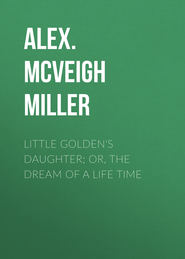По всем вопросам обращайтесь на: info@litportal.ru
(©) 2003-2024.
✖
Pretty Geraldine, the New York Salesgirl; or, Wedded to Her Choice
Настройки чтения
Размер шрифта
Высота строк
Поля
Bending across the counter, he whispered, so that Cissy could not hear:
"I beg your pardon, but did your new admirer—did he call last night?"
"No-o," faltered the girl, and she could hardly keep the tears from her eyes.
"Why, that is strange. What prevented him from keeping his engagement?"
"I do not know."
"You have not heard from him?" he exclaimed, in surprise.
"Not a word," she sighed, then added, quickly: "But I don't think he meant to break his engagement. Perhaps there was a fire, and he had to go."
"Very likely—but, then, he should have sent you an apology early this morning."
"Do you think so? Oh, I suppose he will come and explain in person," said Geraldine, with assumed indifference.
Another customer bustled up to claim her attention, and he bowed himself away, secretly exultant over the fact that she was utterly ignorant of Harry Hawthorne's fate.
"There is no one to come and tell her, and even if it gets into the papers, she is not likely to read it. A poor working-girl has little time for reading," he reflected.
Again his evil genius favored him.
When he went for his call on Geraldine that evening, he found a messenger-boy in the street with a letter for her from the Bellevue Hospital.
He took the letter from the boy, and gave him a quarter.
"I am going in to see Miss Harding now. I will deliver the letter," he said, affably, and the boy, who was in a hurry to get home to his supper, thanked him for the service, and turned away, rejoicingly.
The triumphant actor hid the letter in his breast, congratulating himself on having so easily obtained possession of it.
"I am very fortunate, for had the fickle little beauty received it, all would have been explained between them."
Geraldine came to the door to receive him, and he saw at once how much she had changed toward him by the simple fact that she had not adorned herself in her best gown, as usual, but wore her simple shop-gown of black serge.
She did not care whether she looked fair to him or not, and he quickly realized it, for he was an adept in reading the complex nature of woman. But he hid his chagrin, saying, admiringly:
"Perhaps you do not realize how pretty and demure you look in that black gown."
"Thank you," Geraldine said, listlessly, as she sank into a chair opposite, and tried to seem friendly and interested.
CHAPTER VIII.
"A GIRL HAS A RIGHT TO CHANGE HER MIND."
"Reprove me not that still I change
With every passing hour,
For glorious nature gives me leave,
In wave and cloud and flower.
And you and all the world would do—
It all but dared—the same;
True to myself—if false to you
Why should I reck your blame?"
It made Clifford Standish secretly furious to see how near he had come to losing the charming little beauty on whom he had set his burning heart, and of whom he had felt so sure but a few days ago.
Her pale and pensive looks, her drooping eyes, her pathetic red mouth, all told that her heart was far away, and in his heart he cursed himself for inviting her to go on that fateful excursion to Newburgh, by which he had almost lost her forever.
But he had one chance now to retrieve his misstep, and he set about improving it.
"Well, I will tell you the promised good news!" he exclaimed. "I have at last secured you the wished-for position in my company."
"Oh!" cried Geraldine, starting, and clasping her little hands convulsively together.
But the exclamation was one of dismay rather than of joy.
His quick ear detected it, but he pretended to misapprehend her, and continued:
"I knew you would be delighted to hear it."
"Ye-es," she faltered, weakly; then bracing herself to escape the engagement. "But—but—perhaps I ought not to go on the stage. Cissy is opposed to it."
"Yes, I know—you told me that at first, but you said, also, that you did not care for her opinions—that you should do as you pleased."
Geraldine could not contradict him. It was perfectly true.
She sat speechless and embarrassed, feeling like a little bird caught in the fowler's net, while he continued, smoothly:
"Don't be afraid of Miss Carroll's displeasure. It's only envy and jealousy."
Geraldine, in her resentment against Cissy, had said this to him, too, and she comprehended that he was cleverly turning her own weapons against her now. She could only sit mute and miserable, with a forced smile that was more pathetic than tears.
"'If I could leave this smile,' she said,
'And take a moan upon my mouth,
And let my tears run smooth,
It were the happier way,' she said."
Clifford Standish continued:
"The position offered you is not as good as I could wish, but I shall manage to get you a promotion soon. Our soubrette is going to leave, and you can take her place as soon as you wish."
It was strange how tenaciously Geraldine's mind clung to the dread of Harry Hawthorne's disapproval. She did not wish to go on the stage now, and was eager for a loophole to escape.
"Oh, I don't think I'd like to take a soubrette's place," she cried.
"But last week you said you wouldn't mind it."
"Oh, why do you keep throwing up things I said last week?" she burst out, pettishly.
"I beg your pardon, but did your new admirer—did he call last night?"
"No-o," faltered the girl, and she could hardly keep the tears from her eyes.
"Why, that is strange. What prevented him from keeping his engagement?"
"I do not know."
"You have not heard from him?" he exclaimed, in surprise.
"Not a word," she sighed, then added, quickly: "But I don't think he meant to break his engagement. Perhaps there was a fire, and he had to go."
"Very likely—but, then, he should have sent you an apology early this morning."
"Do you think so? Oh, I suppose he will come and explain in person," said Geraldine, with assumed indifference.
Another customer bustled up to claim her attention, and he bowed himself away, secretly exultant over the fact that she was utterly ignorant of Harry Hawthorne's fate.
"There is no one to come and tell her, and even if it gets into the papers, she is not likely to read it. A poor working-girl has little time for reading," he reflected.
Again his evil genius favored him.
When he went for his call on Geraldine that evening, he found a messenger-boy in the street with a letter for her from the Bellevue Hospital.
He took the letter from the boy, and gave him a quarter.
"I am going in to see Miss Harding now. I will deliver the letter," he said, affably, and the boy, who was in a hurry to get home to his supper, thanked him for the service, and turned away, rejoicingly.
The triumphant actor hid the letter in his breast, congratulating himself on having so easily obtained possession of it.
"I am very fortunate, for had the fickle little beauty received it, all would have been explained between them."
Geraldine came to the door to receive him, and he saw at once how much she had changed toward him by the simple fact that she had not adorned herself in her best gown, as usual, but wore her simple shop-gown of black serge.
She did not care whether she looked fair to him or not, and he quickly realized it, for he was an adept in reading the complex nature of woman. But he hid his chagrin, saying, admiringly:
"Perhaps you do not realize how pretty and demure you look in that black gown."
"Thank you," Geraldine said, listlessly, as she sank into a chair opposite, and tried to seem friendly and interested.
CHAPTER VIII.
"A GIRL HAS A RIGHT TO CHANGE HER MIND."
"Reprove me not that still I change
With every passing hour,
For glorious nature gives me leave,
In wave and cloud and flower.
And you and all the world would do—
It all but dared—the same;
True to myself—if false to you
Why should I reck your blame?"
It made Clifford Standish secretly furious to see how near he had come to losing the charming little beauty on whom he had set his burning heart, and of whom he had felt so sure but a few days ago.
Her pale and pensive looks, her drooping eyes, her pathetic red mouth, all told that her heart was far away, and in his heart he cursed himself for inviting her to go on that fateful excursion to Newburgh, by which he had almost lost her forever.
But he had one chance now to retrieve his misstep, and he set about improving it.
"Well, I will tell you the promised good news!" he exclaimed. "I have at last secured you the wished-for position in my company."
"Oh!" cried Geraldine, starting, and clasping her little hands convulsively together.
But the exclamation was one of dismay rather than of joy.
His quick ear detected it, but he pretended to misapprehend her, and continued:
"I knew you would be delighted to hear it."
"Ye-es," she faltered, weakly; then bracing herself to escape the engagement. "But—but—perhaps I ought not to go on the stage. Cissy is opposed to it."
"Yes, I know—you told me that at first, but you said, also, that you did not care for her opinions—that you should do as you pleased."
Geraldine could not contradict him. It was perfectly true.
She sat speechless and embarrassed, feeling like a little bird caught in the fowler's net, while he continued, smoothly:
"Don't be afraid of Miss Carroll's displeasure. It's only envy and jealousy."
Geraldine, in her resentment against Cissy, had said this to him, too, and she comprehended that he was cleverly turning her own weapons against her now. She could only sit mute and miserable, with a forced smile that was more pathetic than tears.
"'If I could leave this smile,' she said,
'And take a moan upon my mouth,
And let my tears run smooth,
It were the happier way,' she said."
Clifford Standish continued:
"The position offered you is not as good as I could wish, but I shall manage to get you a promotion soon. Our soubrette is going to leave, and you can take her place as soon as you wish."
It was strange how tenaciously Geraldine's mind clung to the dread of Harry Hawthorne's disapproval. She did not wish to go on the stage now, and was eager for a loophole to escape.
"Oh, I don't think I'd like to take a soubrette's place," she cried.
"But last week you said you wouldn't mind it."
"Oh, why do you keep throwing up things I said last week?" she burst out, pettishly.











